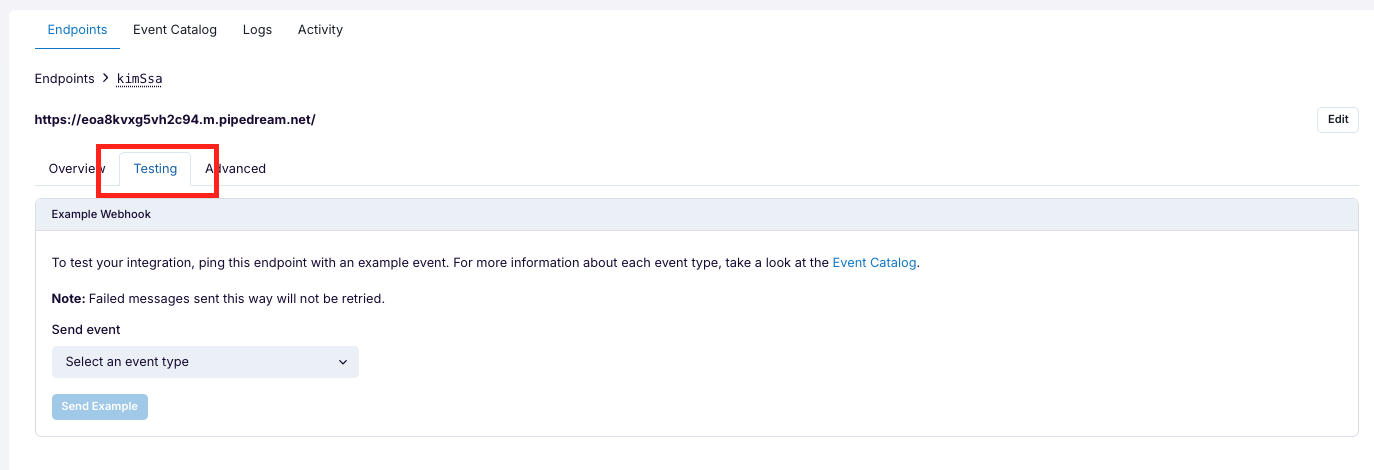Test Webhook Endpoints
Overview
Once you've added an endpoint, you'll want to make sure it's working correctly before relying on it in production. Testing your webhook implementation is crucial for ensuring reliable event processing.
Using the Dashboard Testing Feature
Send Test Events
The "Testing" tab in your webhook dashboard lets you send test events to your endpoint:
- Navigate to your endpoint in the webhook dashboard
- Click the "Testing" tab

- Select an event type (e.g.,
chargeback.created) - Click "Send Example"

After sending an example event, you can click into the message to view:
- The complete message payload that was sent
- All delivery attempts made
- Whether each attempt succeeded or failed
- Response codes and timing information
- Any error messages from failed attempts
Local Development Testing
Using ngrok for Local Testing
If you're developing locally, you can use ngrok to expose your local server:
# Install ngrok if you haven't already
npm install -g @ngrok/ngrok
# Start your local server (e.g., NestJS on port 3000)
npm run start:dev
# In another terminal, expose your local server
ngrok http 3000
# Use the ngrok HTTPS URL as your webhook endpoint
# Example: https://abc123.ngrok.io/webhooks/chargebacksTesting with curl
You can also manually test your endpoint using curl with a sample payload:
curl -X POST https://your-endpoint.com/webhooks/chargebacks \
-H "Content-Type: application/json" \
-H "webhook-id: msg_test123" \
-H "webhook-timestamp: 1692531045" \
-H "webhook-signature: v1,test-signature-here" \
-d '{
"event": "chargeback.created",
"timestamp": "2024-08-20T10:30:45.123Z",
"data": {
"id": "test-chargeback-uuid",
"chargebackId": "TEST_CB_001",
"psp": "stripe",
"currency": "USD",
"amount": 149.99,
"status": "waiting_for_data"
},
"webhookId": "test-webhook-id",
"merchantUuid": "test-merchant-uuid"
}'Integration Testing
End-to-End Testing Flow
- Set up test environment with a test webhook endpoint
- Configure webhook in your test/staging dashboard
- Trigger actual events in your test environment
- Verify webhook delivery and processing
- Check downstream effects (database updates, notifications, etc.)
Test Checklist
Before going to production, verify:
- Endpoint responds correctly to all event types
- Signature verification is working properly
- Error handling works for malformed payloads
- Timeout handling responds within 15 seconds
- Idempotency handles duplicate events correctly
- Logging captures all necessary information
- Database operations complete successfully
- Downstream integrations are triggered properly
Common Testing Scenarios
Success Cases
- Valid
chargeback.createdevent processing - Valid
chargeback.updatedevent processing - Proper signature verification
- Quick response times (< 15 seconds)
Error Cases
- Invalid JSON payload
- Missing required fields
- Invalid signature
- Network timeouts
- Database connection failures
- Downstream service failures
Edge Cases
- Very large payloads
- Special characters in chargeback data
- Duplicate webhook deliveries
- Out-of-order event delivery
Debugging Failed Tests
When tests fail, check:
- Response status codes - Are you returning 2xx for success?
- Response timing - Are you responding within 15 seconds?
- Signature verification - Is your signature validation correct?
- Payload parsing - Are you handling the JSON correctly?
- Error logs - What do your application logs show?
- Network connectivity - Can our servers reach your endpoint?
The webhook dashboard provides detailed logs and retry information to help you debug issues quickly.
Updated 6 months ago